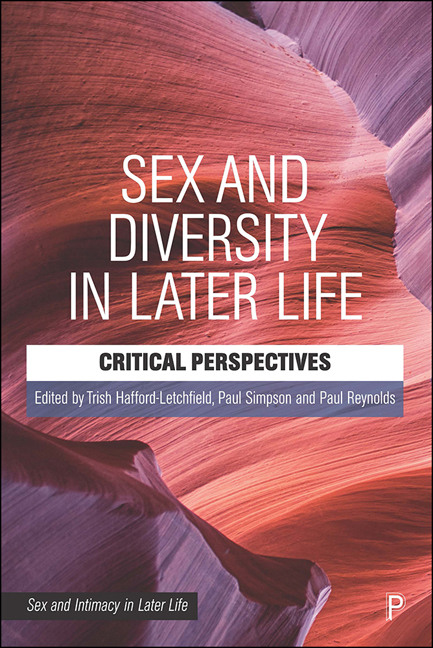Book contents
- Frontmatter
- Dedication
- Contents
- List of figures and tables
- Notes on editors and contributors
- Series editors’ introduction
- Foreword
- 1 Sex and intimacy in later life: a survey of the terrain
- 2 Sexual expression and pleasure among black minority ethnic older women
- 3 Sexual desires and intimacy needs in older persons and towards the end of life
- 4 Heterosexual sex, love and intimacy in later life: what have older women got to say?
- 5 Sex and ageing in older heterosexual men
- 6 Sex and older gay men
- 7 Thinking the unthinkable: older lesbians, sex and violence
- 8 Splitting hairs: Michel Foucault’s ‘heterotopia’ and bisexuality in later life
- 9 The age of rediscovery: what is it like to gender transition when you are 50 plus?
- 10 Ageing asexually: exploring desexualisation and ageing intimacies
- 11 Older people, sex and social class: unusual bedfellows?
- 12 Final reflections: themes on sex and intimacy in later life
- Index
4 - Heterosexual sex, love and intimacy in later life: what have older women got to say?
Published online by Cambridge University Press: 21 December 2021
- Frontmatter
- Dedication
- Contents
- List of figures and tables
- Notes on editors and contributors
- Series editors’ introduction
- Foreword
- 1 Sex and intimacy in later life: a survey of the terrain
- 2 Sexual expression and pleasure among black minority ethnic older women
- 3 Sexual desires and intimacy needs in older persons and towards the end of life
- 4 Heterosexual sex, love and intimacy in later life: what have older women got to say?
- 5 Sex and ageing in older heterosexual men
- 6 Sex and older gay men
- 7 Thinking the unthinkable: older lesbians, sex and violence
- 8 Splitting hairs: Michel Foucault’s ‘heterotopia’ and bisexuality in later life
- 9 The age of rediscovery: what is it like to gender transition when you are 50 plus?
- 10 Ageing asexually: exploring desexualisation and ageing intimacies
- 11 Older people, sex and social class: unusual bedfellows?
- 12 Final reflections: themes on sex and intimacy in later life
- Index
Summary
Introduction
The current epistemology of heterosexuality, love and intimacy in later life has highlighted how older women's sexual desire and sexual expression have been subject to highly gendered socio-cultural restrictions, an emphasis on relationship status and problematisation of physical health. These are associated with dissatisfaction and discomfort for older heterosexual women when talking about their own sexuality with a lack of social legitimacy for doing so. Poor engagement of care professionals with their issues and concerns makes the situation more complex (Hafford-Letchfield, 2008; Gertwitz et al, 2018), for example in terms of the unproblematic acceptance of the consequences and compromise in sexual function that may be constructed when an older woman has pelvic floor weaknesses including incontinences (Mota, 2017).
This chapter reviews some themes on heterosexual desire and sexual expression in later life within the context of socio-cultural and health-related factors. I draw on several sources. First, selected theoretical concepts on heterosexuality in terms of how these speak to the sexual identities of women in later life, or indeed, throughout the life course. Second, I review further some relevant themes from a systematic review I was involved in (Gerwitz et al, 2018) of international empirical research about sexuality and ageing. This review included subjective views of older heterosexual women on their sexuality. Third, heterosexual sex, love and intimacy in later life are illustrated through the case study of women ageing solo, where relationship status has been a key factor in mediating desire and expressions of intimacy in later life (Hafford-Letchfield et al, 2017; Lambert et al, 2018; O’Reilly et al, 2020). These sources will enable focus on factors that differentiate between expression of sexual desire and subsequent pursuance of sexual relationships in later life. I will consider how gender norms and performativity pertinent to existing heterosexual women's sexuality are impacted by external and internalised stigma that accompany ageing and/or are made complex in situations where health is affected. These key themes are examined from a standpoint that highlights discrimination and oppression by placing the voices of heterosexual older women at the centre of a relational analysis of sexuality.
- Type
- Chapter
- Information
- Sex and Diversity in Later LifeCritical Perspectives, pp. 57 - 78Publisher: Bristol University PressPrint publication year: 2021



